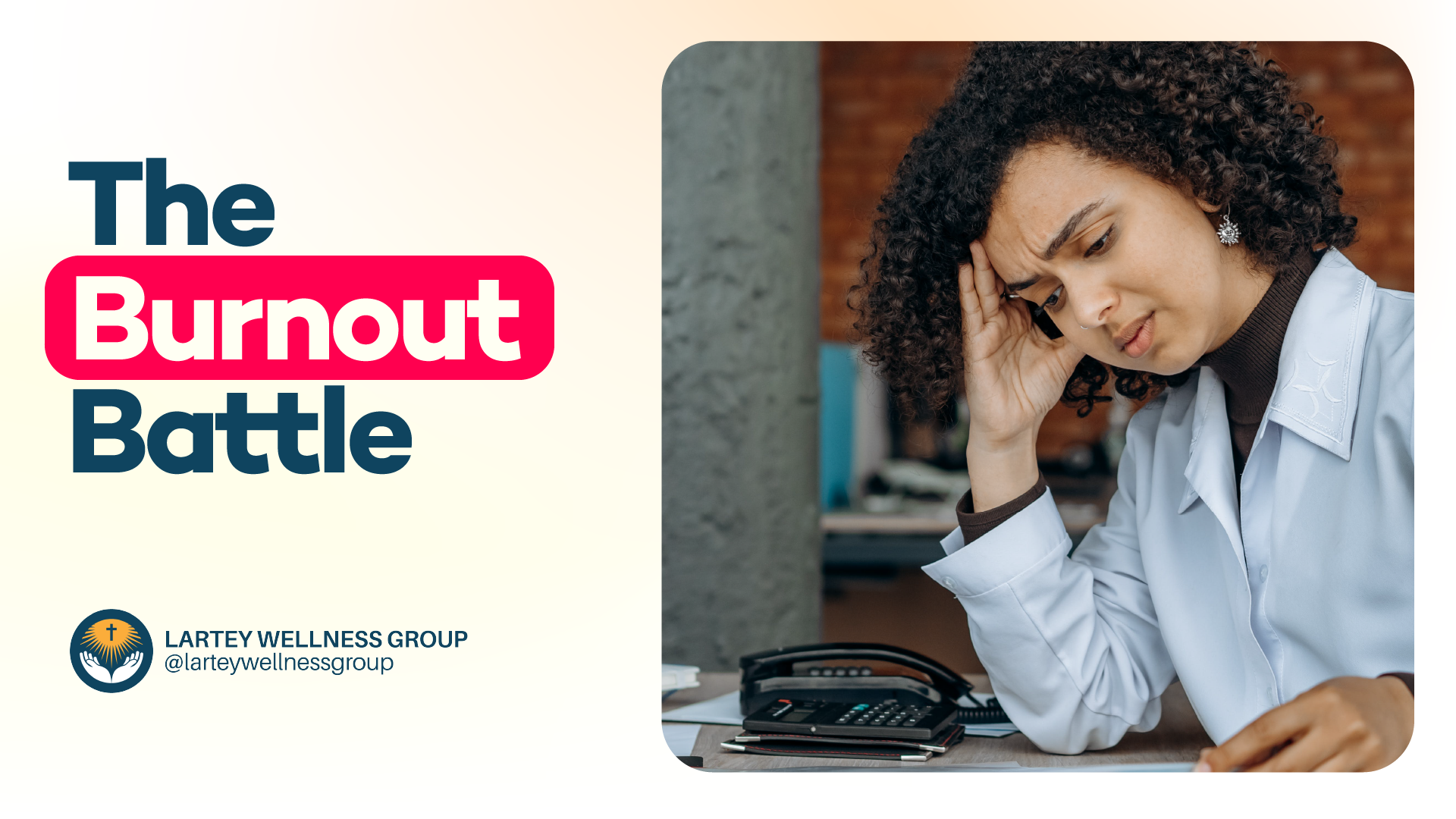Many of us are looking forward to some much-needed time off from work and responsibilities. However, for some, this break may not feel like enough to recharge and rejuvenate. This is because burnout has become a common and increasingly serious issue in today's fast-paced and demanding society. In this blog post, we will discuss the signs that you may be heading towards burnout and why taking a restful holiday season can be the key to winning the battle against burnout.
Understanding the Beast: What is Burnout?
Burnout, also known as occupational burnout, is a state of physical, emotional, and mental exhaustion that results from prolonged and chronic work-related stress. It is characterized by feelings of extreme fatigue, cynicism, and detachment from work, as well as a reduced sense of accomplishment and effectiveness.
Burnout can affect anyone, regardless of their job or industry. It often occurs when the demands placed on an individual exceed their ability to cope with them. This can be caused by a variety of factors, including excessive workload, lack of control or autonomy, inadequate resources or support, and a mismatch between a person's values and the demands of their job.
One of the key features of burnout is the feeling of being overwhelmed and depleted, both physically and emotionally. It can manifest in a variety of ways, such as physical symptoms (headaches, insomnia, and frequent illnesses), emotional symptoms (irritability, depression, and anxiety), and cognitive symptoms (difficulty concentrating, memory problems, and decreased productivity).
Understanding the beast that is burnout is essential in order to recognize and address it. By becoming aware of the signs and symptoms, individuals can take proactive steps to prevent burnout or seek help if they are already experiencing it. In the next section, we will discuss some common signs that indicate you may be on the road to burnout.
Signs That You're On The Road to Burnout
Burnout is a sneaky beast that often creeps up on us when we least expect it. It's important to be able to recognize the signs that you may be on the road to burnout so that you can take action before it becomes overwhelming.
One of the most obvious signs of burnout is feeling exhausted all the time, both physically and mentally. If you find yourself waking up tired and dreading the day ahead, or constantly feeling drained even after a good night's sleep, it could be a sign that burnout is lurking.
Another red flag is a lack of motivation or interest in your work. If tasks that used to excite you now feel like a chore, and you find yourself counting down the minutes until the end of the day, it may be a sign that burnout is taking its toll.
Increased irritability and a short temper are also common symptoms of burnout. If you find yourself snapping at coworkers, family members, or even strangers over minor inconveniences, it could be a sign that you're teetering on the edge of burnout.
Physical symptoms such as headaches, muscle tension, and frequent illnesses can also indicate burnout. When our bodies are under constant stress, it takes a toll on our immune system, making us more susceptible to getting sick.
Lastly, if you find yourself constantly worrying about work, even when you're not there, it may be a sign of burnout. The constant thoughts and anxiety about deadlines, tasks, and responsibilities can consume your mind and make it difficult to relax and enjoy your time off.
If any of these signs resonate with you, it's important to take them seriously. Ignoring burnout can have serious consequences for your mental and physical health. In the next section, we will explore the cost of ignoring burnout and why it's essential to address it head-on.
The Cost of Ignoring Burnout
Ignoring burnout can have serious consequences for your mental and physical health. While it may seem tempting to push through and keep working despite the exhaustion and feelings of detachment, the long-term effects can be detrimental.
When we ignore burnout, we risk perpetuating a cycle of chronic stress and fatigue. This can lead to a compromised immune system, making us more susceptible to illnesses and infections. Our bodies can only handle so much before they start to break down, and ignoring burnout can push us to that breaking point.
Additionally, burnout can have a significant impact on our mental well-being. The constant stress and overwhelming workload can lead to anxiety, depression, and feelings of hopelessness. Our relationships can suffer as well, as burnout often leads to irritability, decreased patience, and an inability to fully engage with others.
In the workplace, ignoring burnout can have negative consequences as well. It can lead to decreased productivity, increased absenteeism, and higher turnover rates. When employees are burnt out, they are more likely to make mistakes, have difficulty concentrating, and lack the motivation to perform at their best.
Ultimately, ignoring burnout is not a sustainable or healthy solution. Taking the time to address and alleviate burnout is essential for our overall well-being. In the next section, we will discuss how embracing the holiday season can be a powerful tool in combating burnout.
Taking the Right Steps: How to Take a Break
it's important to have a plan in place to truly take a break and recharge. Here are some steps you can take to ensure that you make the most of your restful holiday season:
1. Set boundaries: Start by setting clear boundaries between work and personal life. Let your colleagues and clients know when you'll be unavailable and resist the temptation to check emails or take work calls during your time off. This will allow you to fully disconnect and focus on relaxation.
2. Unplug from technology: Take a break from your screens and disconnect from technology as much as possible. Instead, use this time to engage in activities that bring you joy and help you unwind. Whether it's reading a book, going for walks in nature, or spending quality time with loved ones, find activities that nourish your soul.
3. Practice self-care: Use this holiday season as an opportunity to prioritize self-care. Get plenty of rest, eat nourishing foods, and engage in activities that promote relaxation and stress reduction. Take time for yourself to do things that make you feel good, whether it's taking long baths, practicing yoga, or simply taking a nap. Remember, self-care is not selfish; it's necessary for your overall well-being.
4. Reflect and set intentions: Take this time to reflect on the past year and set intentions for the year ahead. What were the highlights and challenges of the past year? What goals do you want to achieve in the coming year? Use this period of rest and rejuvenation to gain clarity and set positive intentions for the future.
5. Practice gratitude: Finally, embrace the holiday season by practicing gratitude. Take a few moments each day to reflect on what you're grateful for. It could be something as simple as a warm cup of coffee or a phone call with a loved one. Practicing gratitude can shift your mindset and help you focus on the positives in your life.
By taking these steps, you can ensure that your holiday season is truly restful and rejuvenating. Remember, it's not just about taking time off, but about intentionally creating space for relaxation and self-care. Embrace this opportunity to recharge so that you can start the new year with renewed energy and focus.
A Word of Caution: Avoiding Holiday Burnout
The holiday season is a time of joy, relaxation, and rejuvenation. However, it's important to approach this time with a word of caution to avoid falling into the trap of holiday burnout. It's easy to get caught up in the whirlwind of parties, shopping, and family obligations, but it's crucial to prioritize self-care and maintain balance.
One of the first steps to avoid holiday burnout is to set realistic expectations. It's easy to feel overwhelmed with the pressure to create the perfect holiday experience, but remember that perfection is not attainable. Focus on what truly matters to you and let go of unnecessary stressors. It's okay to say no to certain invitations or delegate tasks to others.
Another important aspect of avoiding burnout is to establish boundaries. It can be tempting to overcommit and fill up your schedule with social events and obligations. However, it's important to remember that it's okay to take time for yourself. Prioritize rest and relaxation, and don't feel guilty about saying no to events that may drain your energy.
Additionally, be mindful of your physical and mental well-being during the holiday season. It's easy to indulge in unhealthy habits, such as overeating and neglecting exercise, but these can contribute to burnout. Make sure to prioritize nourishing foods, regular physical activity, and adequate sleep.
Lastly, remember to take time for self-care amidst the holiday chaos. Whether it's taking a long bath, practicing mindfulness, or indulging in your favorite hobby, carve out moments for yourself to recharge and rejuvenate.
By being mindful, setting boundaries, and prioritizing self-care, you can avoid holiday burnout and truly enjoy the restful and rejuvenating holiday season you deserve. Remember, the key is to find balance and prioritize what truly matters to you.
It's a Marathon, Not a Sprint: Maintaining Balance Post-Holidays
As the holiday season comes to an end and we transition into the new year, it's important to remember that maintaining balance is a marathon, not a sprint. While the holidays can be a much-needed break from work and responsibilities, it's crucial to carry that sense of rest and rejuvenation with us as we move forward.
After a restful holiday season, it's common to feel motivated and ready to take on the world. However, it's important to remember that burnout is not something that can be solved with a temporary break. It requires ongoing self-care and a commitment to maintaining balance in all aspects of our lives.
To maintain balance post-holidays, it's important to set realistic expectations for ourselves. It's easy to fall back into old habits and take on too much, but it's crucial to prioritize our well-being and avoid overloading ourselves with responsibilities. Remember that it's okay to say no and to set boundaries in order to protect your time and energy.
Another key aspect of maintaining balance is to continue practicing self-care. Whether it's taking breaks throughout the day, engaging in activities that bring you joy, or prioritizing rest and relaxation, self-care is essential for preventing burnout and maintaining overall well-being.
Lastly, it's important to cultivate a healthy work-life balance. This means setting boundaries between work and personal life, prioritizing time for hobbies and activities that bring you fulfillment, and making sure to take regular breaks and vacations throughout the year.
By approaching balance as a marathon and not a sprint, we can avoid falling back into the trap of burnout and create a sustainable and fulfilling lifestyle. Remember, self-care and balance are ongoing commitments that require effort and intention, but the rewards are well worth it. So, as you navigate the post-holiday period, remember to prioritize self-care, set boundaries, and maintain balance in all aspects of your life.






























